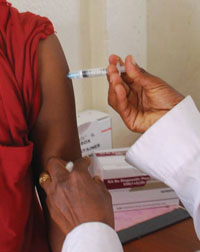7.2.3 Informed consent
Informed consent means that each person who has any sort of procedure done to them in a healthcare context should give their approval for that procedure to be done to them. In order to be fully informed, it is the duty of the healthcare worker to tell the person exactly what the procedure will involve as well as the things that might happen if the procedure is not carried out. In Case Study 7.1 it is clear that Almaz will need further treatment at the health centre and that she will need to give her informed consent for this to take place. There is an ethical obligation on Chaltu, her Health Extension Practitioner, to explain to Almaz what will happen at the health centre, but also the possible consequences if she does not attend.
Which of the following healthcare procedures that might be undertaken by a Health Extension Practitioner require informed consent?
- a.Getting the community together to construct a new latrine.
- b.Immunizing a pregnant woman with tetanus toxoid.
- c.Testing a young boy to see if he has malaria.
- d.Distributing an Insecticide Treated Bed Net (ITN) to a family.
Procedures b. and c. certainly require informed consent to be given. The Health Extension Practitioner should explain the procedure to their patient on each occasion and be prepared to answer their questions and concerns. If the patient is under the age of consent, the parents have to give their informed consent. Constructing a new latrine or supplying ITNs are important parts of the preventive work of every Health Extension Practitioner, but do not require such a degree of informed consent. However, even these preventive activities need to be explained so that they will be adopted by members of the community.
Informed consent is implied in much of the work that Health Extension Practitioners do. In other words if a mother brings her child to the Health Post to be immunized, informed consent is necessary because the Health Extension Practitioner is performing a procedure that has benefits, but may also have side-effects. However, the act of bringing the child for the procedure implies consent, as does attending for a contraceptive injection (Figure 7.5). But Health Extension Practitioners should always explain what they are doing and how it impacts on individuals, their families and the wider community.

7.2.2 Autonomy
